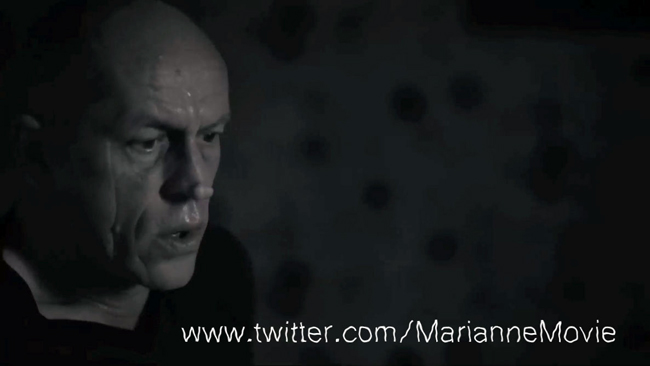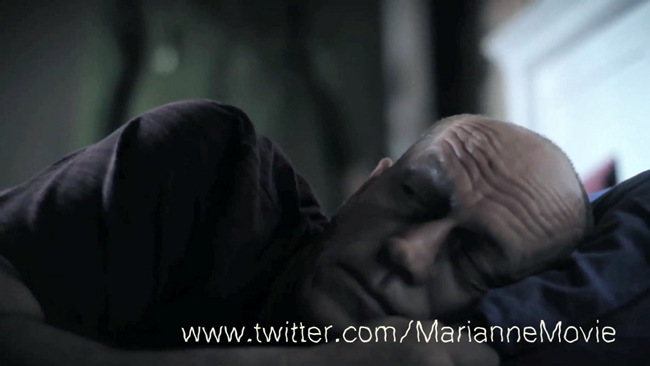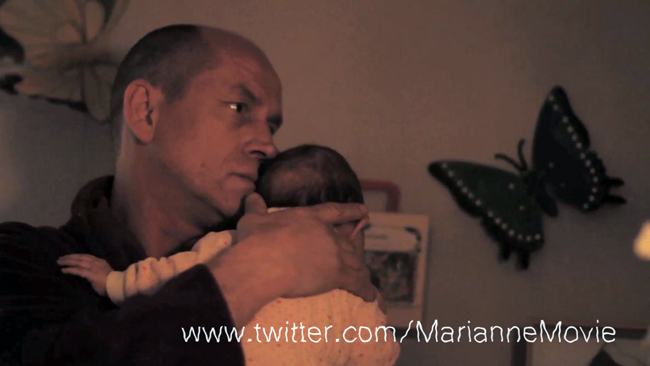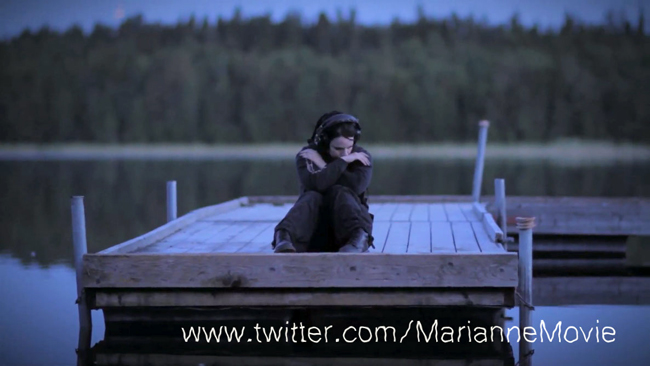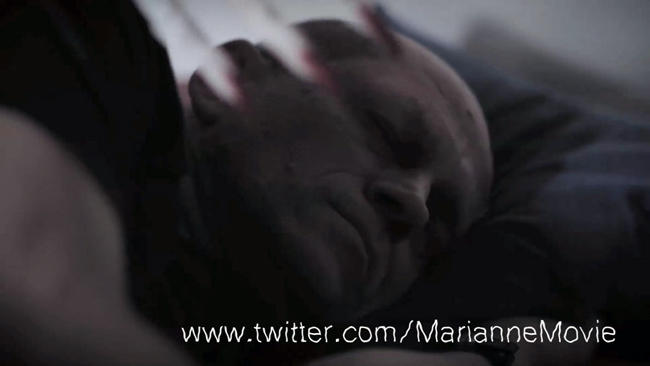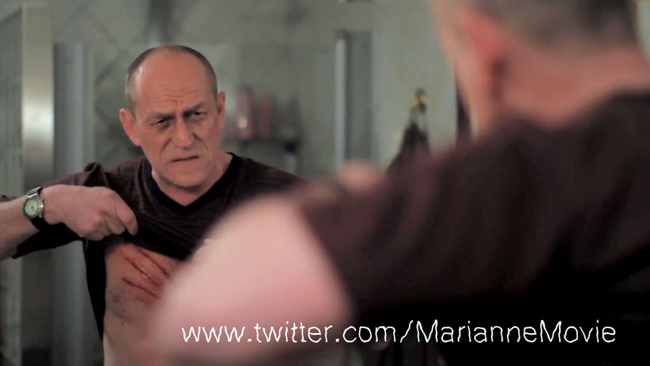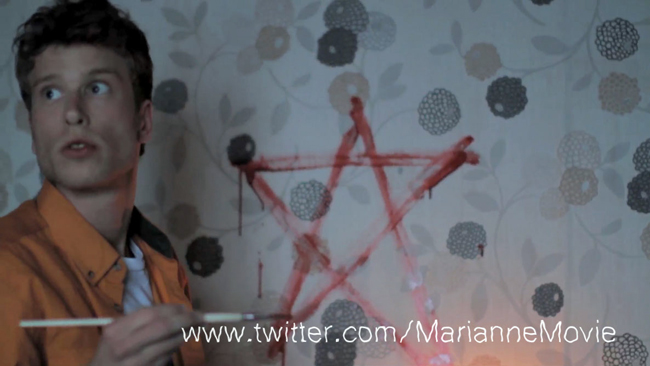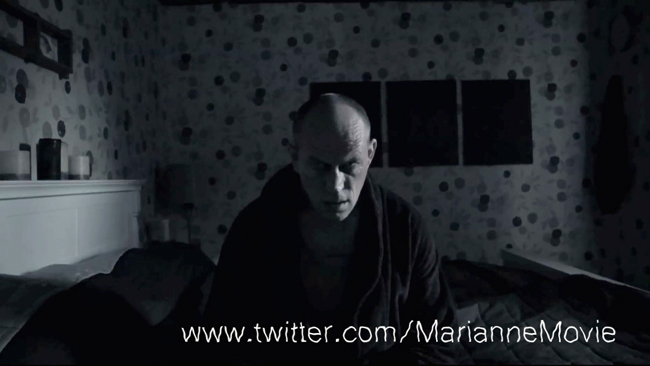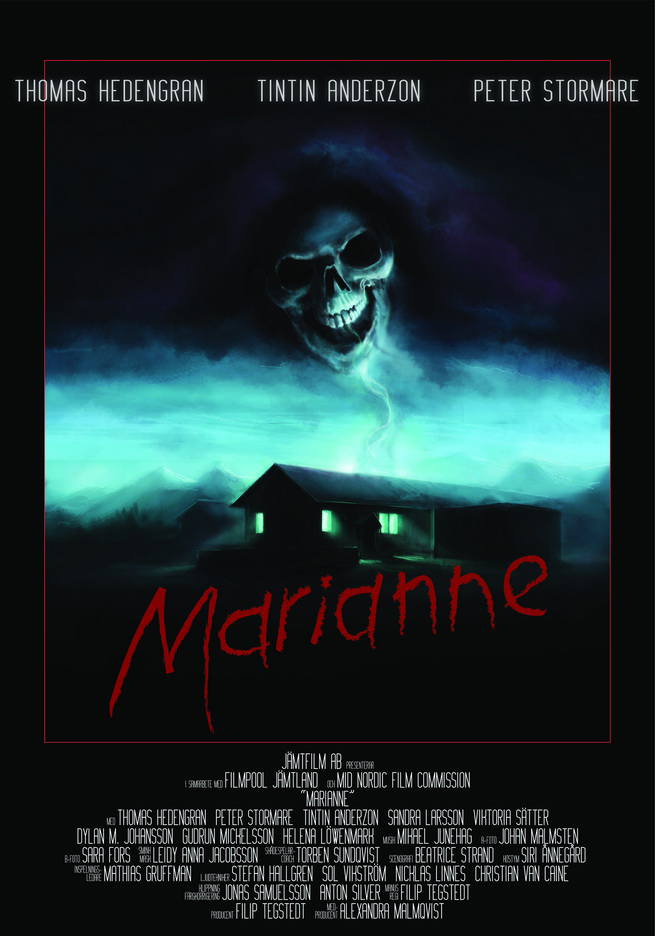The Northlander: talking to MARIANNE director Filip Tegstedt
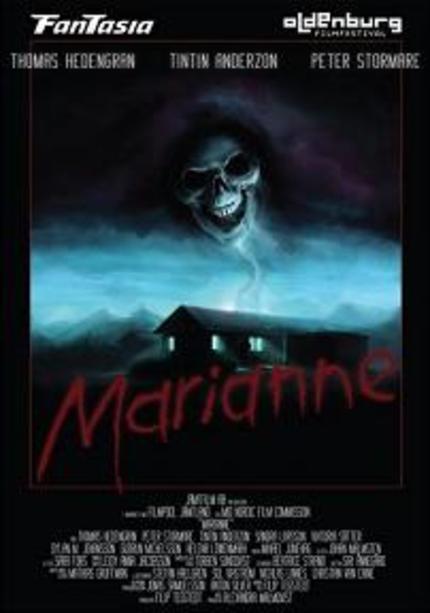
Eight Rooks: Let's start with the obvious question - how would you describe Marianne for anyone who's never even heard of the film?
Filip Tegstedt: Well, I'd describe it as a lo-fi drama horror maybe? Here in Sweden we have a tradition of having a kitchen sink realism feel in our films and instead of making an "American" horror movie, or a "Japanese" horror movie, I wanted to make a "Swedish" horror movie and embrace that. So it's kind of a "Kitchen sink horror" maybe.
I don't really like comparing it to other films, because if I say "it's kind of like Dark Water but Swedish" and I mean it in terms of structure or certain aspects of the storytelling, you might think of it in terms of atmosphere or style and it's not that. Maybe "A cross between Repulsion and American Beauty" is a better description. I don't know.
ER: This is your first film and you had quite a struggle to get it made, from what you were telling the audience at Leeds. Would you mind summing that up again? What was the point in your career you knew you wanted to make the jump to directing, and what were the obstacles you ran into?
FT: I've been wanting to do this for a long time, pretty much since high school when me and some friends were having fun making ninja movies in the late 90's. But it takes a while, you know? I did film school from 2003 to 2005, studying screenwriting to learn how to tell a story. Then did the PA thing in television for a while and quit to direct a few shorts and a web TV series on zero budgets. But I had this idea for Marianne, to make a lo-fi Swedish kitchen sink horror back in film school and in January 2009 I started working on the screenplay full time and have been going strong since.
I funded the film by selling everything I owned, including the inheritance from my parents and that got me about half way. The rest was a short term, high interest loan of about €50,000. It's a major risk to say the least, but the Swedish Film Institute doesn't fund first time filmmakers if they don't already have a major production company as well as a distributor already and the chances of getting either of those as a first time filmmaker is next to impossible. They've set up a catch 22 for independent filmmakers.
What it says on their website is that in order to even apply for feature film funding as an independent producer you need to have at least three years of continued feature film production experience. That's to even send in an application. They're also not very big on the horror genre, since horror films are not considered "quality films", so there's a major reason you don't see too many horror films come out of Sweden, or a lot of independent films.
There are a lot of unemployed potentially brilliant filmmakers in this country that are much more talented than I am who might never make their first feature film. Hell, we could have the next Sam Raimi, Peter Jackson or Stanley Kubrick (or Ingmar Bergman for that matter) living in Sweden but because the system is the way it is we might not ever know that. I have friends who are much better filmmakers than I am, and who have struggled for over five years getting their projects off the ground, going from producer to producer but never actually finding their way onto a set.
I wouldn't advise anyone to fund their film the way I funded Marianne, but sometimes you just gotta go out and shoot, you know?
ER: You've also written the whole thing yourself? Was there ever any question of handing the script to someone else to get it realised? Was it a matter of wanting to keep control, or would it have been harder to get the script looked at than to scrape the financing together and find a cast and crew?
FT: I talked to a lot of producers in 2009 while I was writing the screenplay. Some of them wanted to make the film, and I didn't want to produce it alone, I just wanted producer cred as well as sole director's and writer's cred because I needed this to be a stepping stone to my next project. I needed to make a debut.
The producers who were interested all wanted to shoot the film in the south of Sweden (the northlands of Sweden make up 2/3 of the geography, but only 12% of the population live here. Most people live in the south, including producers and their families). However, Marianne is the story about my hometown, the place where I grew up, and the people who live there.
I wanted to shoot it in a documentary way with hand held cameras, natural light and use the beautiful environments of the Swedish north with the scary pine forrests, snowy mountains, clear lakes and bright summer nights. It's a special kind of place and I wanted to capture that in a natural way. The story takes place in the suburb where I grew up, two blocks from my old house, and I just wanted to actually shoot the film there as well.
So yeah it was important that I write the thing myself. A lot of the producers I took it to also told me they wanted to have the screenplay re-written by friends of theirs and I've just seen this sort of thing go down so many times to other people I decided to decline. I don't mind films being shot in one location and have them take place in another, and I don't mind working together with other people on my writing, but this was a personal film, and a special case.
I did work with two really good script analysers though, who gave me great notes over the seven drafts of the script that I did in 2009 and helped me make the story better.
ER: A lot of first-time writer-directors working in genre movies seem to front-load their scripts with material that's designed to catch an audience's attention, yet you've only got one scene of explicit violence and the entire cast are constantly questioning whether any of the fantastical things in the film are actually happening. Do you still see Marianne as a horror film, rather than a character drama with elements of horror, say? If so, did you always want it to be like that?
FT: Structurally speaking, it's a horror film, so that's the way I see it. It's got a monster, and the monster is killing people off. Whether the monster is "real" or "imagined" or whether people are dying because of the monster or because of other reasons is a matter for interpretation, but to the main character, that's what's going on and it's through his eyes we're watching the events take place. From his point of view, it's horror.
What sets this story apart from, say The Shining is that the A-story is the family conflict and the B-story is the haunting and not the other way around, which is the "traditional" way of doing it. I've always thought of it as a drama-horror and for the first three drafts of the screenplay, Sandra (the daughter) was the main protagonist just as much as Krister (the father).
Originally, the second act was all about Sandra and the life she created for herself after she quit school. But since it's her father that's experiencing the horror aspects of the story I needed to shift focus more towards him. I guess I could have shifted it even more, but to me it was always Sandra's story. The things she's subjected to is really what I wanted to tell. Most movies in this particular horror sub genre are too busy throwing things at the audience and the characters lose some of their humanity.
So I wanted to keep that and keep the focus on Krister's suffering through not knowing reality from fantasy. It's like when you talk to someone who used to be on heavy drugs and they tell you about the hallucinations they had coming off it. That, to me, is horror. Not knowing what's real or not.
ER: Regardless of what actually ended up on screen, what influences would you say went into making Marianne? The poster art - and to some extent the presentation of the cut we saw at Leeds, with the colour palette and the titles - is very reminiscent of classic eighties horror in particular. Was this just something done for fun or do you consider Marianne draws on those films in some way?
FT: I love 80's poster art, and I see more and more films return to that now that there's a nostalgia trend. I think that's a good thing and anything really that gets us away from "Floating Heads" is just good. We've had floating heads for nearly 20 years now since Scream came out.
I watch a lot of horror, and a lot of other films as well, so my influences were all over the place, but I think I must have seen at least 250-300 horror films just when I was writing the screenplay for this. The ones that influenced me the most were movies like Dark Water, The Shining, Black Sabbath, Nosferatu, Ringu, American Beauty, Donnie Darko, Repulsion, Draugasaga, Kill Baby Kill, and tons of other stuff.
The Let the Right One In novel had a great influence on me as well in terms of being a kitchen sink horror story, and a very Swedish story and very personal to the author. I listened to a lot of Smashing Pumpkins too, especially the Adore album, during the writing. And of course, it was a lot about dealing with my own mother passing away from cancer too a year earlier.
ER: You talked about the protagonist as being something of an ass, and he's clearly not a very good person - yet the story seems very sympathetic to him despite the terrible things he's done or the mess he's made of his life. It doesn't feel like a particularly judgemental film; it doesn't seem to present the ghost as a punishment the main character explicitly deserves, but rather cause and effect. Was that the way you intended it to be read, or do you see it as open to question? Is there supposed to be any moral element to the film at all?
FT: Not moral in the sense that I'm trying to pass judgement, no. Look, Krister has made a lot of mistakes in his life, but that's being human, and that makes him interesting and three-dimensional (in the good sense of the word). Good characters are always contradictory but it's always important to see it from their perspective when it's the main character. If we don't like the main character, we don't care what happens to him or the people around him.
After all, in the end he's actually trying to do the right thing after having screwed up, and that's the story.
ER: The dramatic elements in the script felt far more well-realised than a lot of genre movies manage. You mentioned the protagonist's darker traits are drawn from various aspects of different people you've known, but would you say you 'researched' the domestic side of the story, the idea of a man struggling to hold his family together? Are setpieces like the interaction between the protagonist and his daughter drawn from your own experience at all? Or did most of it just come out of your own head?
FT: It's all a mix. It's not like one particular character is completely based on one particular person I've known. It's more like in one particular scene, one particular character is doing something I've either done myself or I've seen someone do. In another scene, that character is doing something based on someone else. The film is not supposed to be a retelling of my own youth in that sense. That would just be... weird, you know?
ER: I felt Marianne seemed more or less like a coherent whole, with few if any wasted scenes, but you mentioned potential distributors pressing for possible cuts to the running time. Could you sum that up briefly at all? Obviously you had any number of limitations on the amount of money and time you could put into Marianne and you talked about how reshoots or further edits would be massively prohibitive but can you point to any one thing about the film you'd most like to redo if you had the chance? What would you say you're happiest with?
FT: I'm very happy with the film as it is, and we've had a lot of great response from audiences and critics. It's been nominated for Best International Indie at the Edmonton International Film Festival, and the Méliès D'Argent at Leeds International Film Festival, so people like it. If I can I will absolutely make this version available in some form or another, but a lot of distributors are being careful because it's not a straight genre and it's not a straight drama and maybe it's difficult to label exactly what it is.
Going back to an earlier reply, if I say it's a horror film, then my definition of a horror film might be different from yours and when you're selling something in mass quantities to a large public you need to be clear to them what they're getting so it's all about finding a right way to promote the film I think. If I do sit down and make a director's cut, it will be a complete Redux where I re-edit it from scratch with new takes. It will be very different, a completely new film, but of course the same story.
But there are always people who want to see the original version, and I very much hope that will be available in some form or other.
ER: Again, I know the distribution of the film is somewhat up in the air, and the money you had to put into this already makes it difficult to think in terms of future projects, but how has the experience of making Marianne influenced what you'd like to do next? Would you want to make another film that covers similar subject matter? Would you want or be able to work with any of the same actors? Would you want to go smaller-scale after the effort of getting this film finished?
FT: I've got a lot of story ideas I'd like to do, actually. I've got this time travel story I want to do, which is like a dark Back to the Future / Butterfly Effect / Somewhere in Time type story but more like a thriller. I've also got an idea for a violent swords and sorcery movie with vikings and a couple of others as well. But I don't think I would want to make a movie for less than €300,000 (Marianne was about €100,000 in production costs). I'd love to go higher, like a couple of million, but no less than that. Filmmaking is hard work and takes a long time.
ER: Thanks very much for the interview.












Do you feel this content is inappropriate or infringes upon your rights? Click here to report it, or see our DMCA policy.


